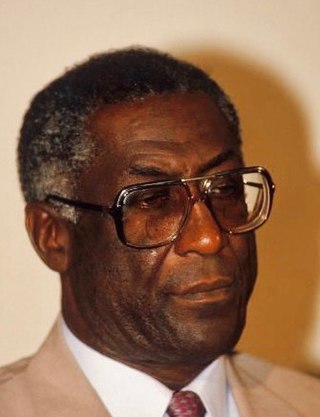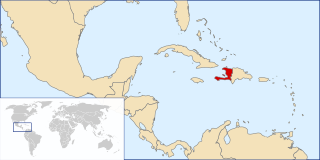Related Research Articles

Jean-Bertrand Aristide is a Haitian former Salesian priest and politician who became Haiti's first democratically elected president in 1991 before being deposed in a coup d'état. As a priest, he taught liberation theology and, as president, he attempted to normalize Afro-Creole culture, including Vodou religion, in Haiti.
Joseph Raoul Cédras is a Haitian former military officer who was the de facto ruler of Haiti from 1991 to 1994. Cedras was the last military ruler of Haiti.

Fanmi Lavalas is a social-democratic political party in Haiti. Its leader is former Haitian President Jean-Bertrand Aristide. It has been a powerful force in Haitian politics since 1991. Fanmi Lavalas governments advocate a policy of "growth with equity" based on Western European social democratic principles. Fanmi Lavalas governments have emphasised investment in education and health care as their priorities and have refused International Monetary Fund austerity measures.

A coup d'état in Haiti on 29 February 2004, following several weeks of conflict, resulted in the removal of President Jean-Bertrand Aristide from office. On 5 February, a rebel group, called the National Revolutionary Front for the Liberation and Reconstruction of Haiti, took control of Haiti's fourth-largest city, Gonaïves. By 22 February, the rebels had captured Haiti's second-largest city, Cap-Haïtien and were besieging the capital, Port-au-Prince by the end of February. On the morning of 29 February, Aristide resigned under controversial circumstances and was flown from Haiti by U.S. military and security personnel. He went into exile, being flown directly to the Central African Republic, before eventually settling in South Africa.
Louis-Jodel Chamblain is a prominent Haitian military figure who has led both government troops and rebels.

Operation Uphold Democracy was a multinational military intervention designed to remove the military regime led and installed by Raoul Cédras after the 1991 Haitian coup d'état overthrew the elected President Jean-Bertrand Aristide. The operation was effectively authorized by the 31 July 1994 United Nations Security Council Resolution 940.

Matthieu Prosper Avril is a Haitian political figure who was President of Haiti from 1988 to 1990. A trusted member of François Duvalier's Presidential Guard and adviser to Jean-Claude Duvalier, Lt. Gen. Avril led the September 1988 Haitian coup d'état against a transition military government installed after Jean-Claude Duvalier's 1986 overthrow. He was President until March 1990, in a period which according to Amnesty International was "marred by serious human rights violations". He was arrested in 2001, but released in March 2004 after the 2004 Haitian coup d'état overthrew Jean-Bertrand Aristide.
Jean Léopold Dominique was a Haitian journalist and activist for human rights and democracy in Haiti. His station, Radio Haiti-Inter, was the first to broadcast news, investigative reporting, and political analysis in Haitian Creole, the language spoken by most Haitian people. On 3 April 2000 he was assassinated as he arrived for work at Radio Haiti-Inter. An extensive though turbulent investigation failed to officially identify and bring to justice the primary perpetrators, who remain at large.
Antoine Izméry was a Haitian businessman and pro-democracy activist.
The Raboteau massacre was an incident on April 22, 1994, in which military and paramilitary forces attacked the neighborhood of Raboteau Gonaïves, Haiti, the citizens of which had been participating in pro-Jean-Bertrand Aristide demonstrations. At least 23 residents were killed, though most groups estimated the true casualties to be higher.
Gérard Jean-Juste was a Haitian Catholic priest who served as rector of Saint Claire's Church for the Poor in Port-au-Prince. He was also a liberation theologian and a supporter of the Fanmi Lavalas political party, as well as heading the Miami, Florida-based Haitian Refugee Center from 1977 to 1990.
Kevin Pina is an American journalist, filmmaker and educator. Pina also serves as a Country Expert on Haiti for the Varieties of Democracy project sponsored by the University of Notre Dame Center for Research Computing, the University of Gothenburg Department of Political Science, and the Helen Kellogg Institute for International Studies.

General elections were held in Haiti on 7 February 2006 to elect the replacements for the interim government of Gérard Latortue, which had been put in place after the 2004 Haiti rebellion. The elections were delayed four times, having originally been scheduled for October and November 2005. Voters elected a president, all 99 seats in the Chamber of Deputies of Haiti and all 30 seats in the Senate of Haiti. Voter turnout was around 60%. Run-off elections for the Chamber of Deputies of Haiti were held on 21 April, with around 28% turnout.

Marc Louis Bazin was a World Bank official, former United Nations functionary and Haitian Minister of Finance and Economy under the dictatorship of Jean-Claude Duvalier. He was prime minister of Haiti appointed on June 4, 1992, by the military government that had seized power on September 30, 1991.

Michel Joseph Martelly is a Haitian musician and politician who served as the 42nd president of Haiti from May 2011 until February 2016. On August 20, 2024, the United States sanctioned the former president for trafficking drugs, in particular cocaine, into the United States, and for sponsoring several gangs based in Haiti.

United Nations Security Council Resolution 841, adopted unanimously on 16 June 1993, after recognising the need for an urgent settlement to the situation in Haiti and the efforts of the Secretary-General of the United Nations Boutros Boutros-Ghali and the Secretary General of the Organization of American States João Clemente Baena Soares, the Council placed various international sanctions on Haiti.

The 1991 Haitian coup d'état took place on 29 September 1991, when President Jean-Bertrand Aristide, elected eight months earlier in the 1990–91 Haitian general election, was deposed by the Armed Forces of Haiti. Haitian military officers, primarily Army General Raoul Cédras, Army Chief of Staff Philippe Biamby and Chief of the National Police, Michel François led the coup. Aristide was sent into exile, his life only saved by the intervention of U.S., French, and Venezuelan diplomats. Aristide would later return to power in 1994.
Aristide and the Endless Revolution is a 2005 feature documentary directed and produced by Nicolas Rossier about former Haitian President Jean-Bertrand Aristide and the coup d'etat that ousted him from the country in 2004. Rossier was the first media professional to get exclusive access to Aristide while in exile and the resultant interview is featured in the film, as well as interviews with many experts on Haiti, including U.S. Representative Maxine Waters, noted economist Jeffrey Sachs and Aristide's lawyer Ira J. Kurzban.
Three pro-democracy Haitian radio journalists were assassinated in Little Haiti, Miami, Florida, United States between 1991 and 1993.
The 45th Legislature of the Haitian Parliament was in office from 4 February 1991 to 4 February 1995.
References
- ↑ "Haiti: We Must Kill the Bandits". Chicago Reader. 2007-10-11. Retrieved 2024-08-14.
- ↑ Miles, Melinda; Charles, Mary Eugenia (2004). Let Haiti live: unjust U.S. policies towards its oldest neighbor. Educa Vision Inc. ISBN 9781584321880 . Retrieved 2011-07-21.